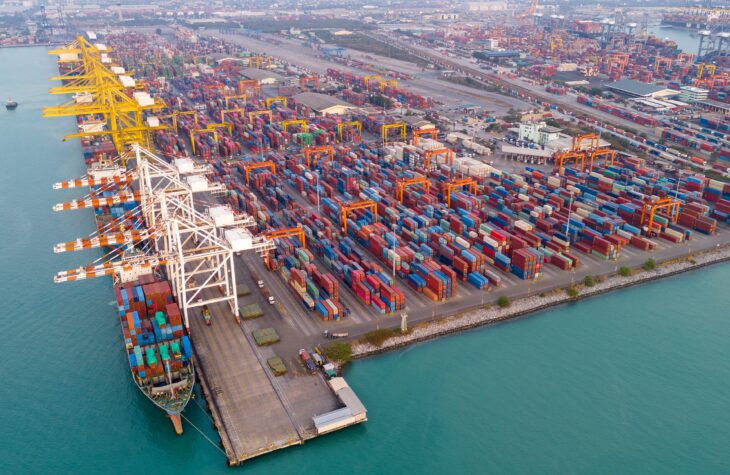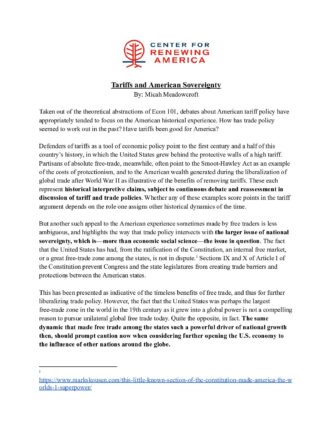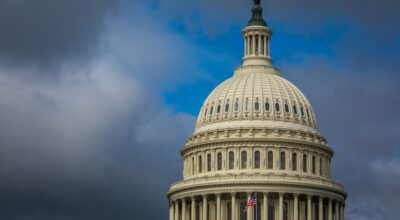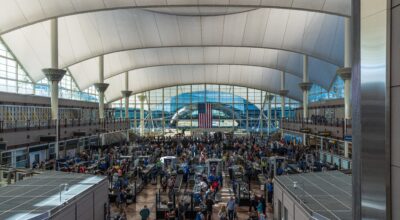
Tariffs and American Sovereignty
This is the fifth short paper in a series on tariff policy. The introduction, “What is a Tariff For?” can be found here. The second entry, addressing concerns that tariffs contribute to inflation, can be found here. The third entry, looking at the mechanism by which tariffs may boost domestic production, can be read here. And the fourth, on “trade wars,” can be read here.
Taken out of the theoretical abstractions of Econ 101, debates about American tariff policy have appropriately tended to focus on the American historical experience. How has trade policy seemed to work out in the past? Have tariffs been good for America?
Defenders of tariffs as a tool of economic policy point to the first century and a half of this country’s history, in which the United States grew behind the protective walls of a high tariff. Partisans of absolute free-trade, meanwhile, often point to the Smoot-Hawley Act as an example of the costs of protectionism, and to the American wealth generated during the liberalization of global trade after World War II as illustrative of the benefits of removing tariffs. These each represent historical interpretive claims, subject to continuous debate and reassessment in discussion of tariff and trade policies. Whether any of these examples score points in the tariff argument depends on the role one assigns other historical dynamics of the time.
But another such appeal to the American experience sometimes made by free traders is less ambiguous, and highlights the way that trade policy intersects with the larger issue of national sovereignty, which is—more than economic social science—the issue in question. The fact that the United States has had, from the ratification of the Constitution, an internal free market, or a great free-trade zone among the states, is not in dispute.1 Sections IX and X of Article I of the Constitution prevent Congress and the state legislatures from creating trade barriers and protections between the American states.
This has been presented as indicative of the timeless benefits of free trade, and thus for further liberalizing trade policy. However, the fact that the United States was perhaps the largest free-trade zone in the world in the 19th century as it grew into a global power is not a compelling reason to pursue unilateral global free trade today. Quite the opposite, in fact. The same dynamic that made free trade among the states such a powerful driver of national growth then, should prompt caution now when considering further opening the U.S. economy to the influence of other nations around the globe.
The Founders set the United States up as a free trade zone because they were building a nation out of 13 separate colonies. Commerce was an economic tool to accomplish the political end of unity. It reinforced, through economic exchange, the common culture and national identity of the young republic. Today, when American independence and sovereignty are under threat—especially from Chinese industrial might, influence on multilateral institutions, and corporate espionage—increased commercial interdependence is precisely the problem.
Indeed, this unifying logic inherent in economic integration is, for some free traders, the whole point: Put uncharitably, they are often globalists, who do not believe in nations as anything more than incidental formalities; put more charitably, despite obvious failure in the case of communist China, they cling to the post-Cold War dream of liberalized trade creating a freer and more peaceful world.
In this perspective, the political influences and cultural convergence unregulated trade may produce (may—recall it did not save the United States from Civil War) are features, added benefits on top of cheaper consumer items. This dynamic defines the politics and controversies of the European Union, for example, especially seen in the U.K.’s hesitance to join the bloc and eventual decision to leave it, which even before its establishment was thought of not only in terms of economic growth but as a post-national project, and potentially even tending toward something like a United States of Europe.
Recognizing this, the essentially political and instrumental nature of international trade policy is brought back to light. Indeed, the whole tariff debate must be taken out of the realm of academic economics, with its concern for global efficiency, and returned to where it belongs: the politics of the national interest. Economics, as a social science, informs political decisionmaking, but as a tool or means, not a ruler or ends. The question at hand is what trade policies are, at present, best for preserving and strengthening American sovereignty.
Tariffs do not end trade between nations, but shape its contours and effects. Because trade relations are reciprocal, American policymakers must care about the industrial policies and protectionist practices of other countries. When they do not counterweight those policies with trade protections and investment programs for America, they allow foreign actors to shape both the global and domestic markets on terms conducive to their ends, thus de facto setting industrial policy for the U.S. If China takes its trade and export policies seriously as a matter of national priority, as a major trade partner, America must, too.
The global elites who manage today’s enormous multinational corporations, detached from ties of loyalty to the nation that gave birth to so many of them—executives and firms—have been more than happy to exploit America’s openness to the world for their own pecuniary advantage. But despite the cheap goods produced by the status quo, American citizens, as citizens who need good jobs and a secure nation, cannot afford to defer the responsibility of setting American industrial policy to foreign powers or the proverbial consumer and corporation. After all, as the Constitution’s preamble reminds posterity, the task of promoting the general welfare and securing the blessings of liberty lies with the American people exercising their political responsibilities.
Endnotes




